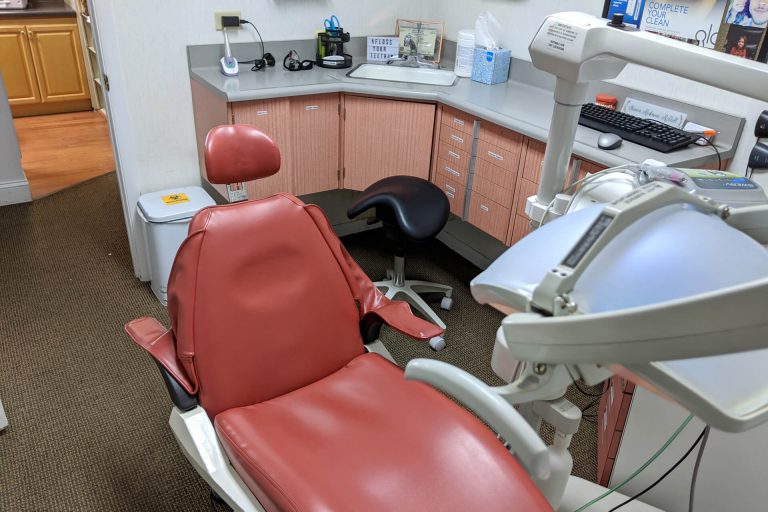
23 Apr What Does Stress Do To My Teeth?
We all know stress is bad. It messes with our sleep, our mood, and even our appetite. But your teeth? Yes! Stress doesn’t skip your mouth. Most people don’t connect stress with dental health, but the effects are real. In fact, what’s going on in your brain can end up doing serious damage to your teeth and gums
Teeth Grinding Wears Down Enamel
Ever wake up with a sore jaw or sensitive teeth? That’s often a sign you’re clenching or grinding your teeth at night. The medical term for this is bruxism. Bruxism isn’t just annoying, it’s destructive. When you grind your teeth, you’re wearing down your enamel, the outer layer that protects your teeth from decay. Once enamel wears away, it doesn’t grow back. That makes your teeth more sensitive and vulnerable to cavities, chips, and fractures.
Stress is one of the biggest causes of bruxism. It doesn’t always happen when you’re awake. Many people grind their teeth at night and don’t even realize it until symptoms show up, like headaches, jaw pain, or even cracked teeth. If this sounds familiar, talk to your dentist. They may suggest a nightguard. That’s a mouthpiece you wear while sleeping to protect your teeth. Also, think about tackling the root of the problem. Managing your stress during the day can reduce grinding at night.
Stress Leads to Gum Disease
Your immune system is your body’s defense. But when you’re under constant stress, your body shifts into survival mode, and that weakens your immune system. That includes your mouth. Chronic stress makes it harder for your body to fight off infections. This means your gums are more vulnerable to bacteria that cause gingivitis and periodontitis. If you already have some gum issues, stress can make things worse, fast.
Stress raises your cortisol levels. Cortisol is your body’s stress hormone, and too much of it can lead to inflammation. Your gums become inflamed and start to pull away from your teeth. Then bacteria sneak in, and your gums get infected. This might not sound like a big deal, but gum disease is serious. It’s one of the leading causes of tooth loss in adults. And it doesn’t stop there. Gum disease is linked to heart problems, diabetes, and other chronic conditions. To fight back, you need a two-part approach: good oral hygiene and better stress management. Don’t skip the floss. And you can look into healthy coping strategies like exercise, breathing exercises, or therapy.
Stress Increases Cavity Risk
You may have noticed that when you’re anxious, your mouth feels dry. That’s not your imagination, it’s science. Stress affects your nervous system and can reduce how much saliva your body makes. Certain stress-related medications, like antidepressants, can also dry out your mouth. And saliva is more important than people realize. Saliva protects your teeth by neutralizing acid and washing away leftover food and bacteria. It also helps with chewing and speaking. When you don’t have enough, your mouth becomes a breeding ground for bacteria. That means more plaque, more cavities, and more gum issues.
If your mouth constantly feels dry, sip water regularly. Avoid alcohol, caffeine, and tobacco which dry out your mouth even more. Sugar-free gum can also help by boosting saliva production. And if you’re taking medication that causes dry mouth, talk to your doctor or dentist about alternatives or solutions. Dry mouth isn’t just uncomfortable, it’s a real threat to your teeth. Don’t ignore it!
Stress Leads to Poor Oral Hygiene Habits
When life gets chaotic, routines tend to go out the window. That includes your dental habits. When you’re overwhelmed, brushing and flossing often fall to the bottom of the list. Maybe you skip a night. Maybe you start eating more sugary snacks or drinking more soda or coffee. It all adds up. Stressed-out people are less likely to keep up with regular brushing and flossing.
They also tend to miss dental appointments and make less healthy food choices. The result? More plaque, more tartar, more problems.
Stress also makes you more likely to engage in oral habits that hurt your teeth like biting your nails, chewing ice, or using your teeth as tools. Each one of those habits can lead to cracks, chips, or wear on your teeth. If your schedule’s packed, keep it simple. Brush twice a day, floss once, and schedule checkups every six months. Even when everything feels out of control, your mouth doesn’t have to be.
Stress Triggers Mouth Sores
If you’ve ever had a painful little ulcer inside your mouth that shows up during busy weeks, you’ve met the canker sore. Stress doesn’t cause canker sores directly, but it definitely helps trigger them. Canker sores (small, painful spots inside the mouth) are more common when you’re run-down or emotionally drained. The same goes for cold sores, which appear outside the mouth and are caused by the herpes simplex virus. Stress can make those flare up, too. These sores don’t just hurt. They can make eating and talking uncomfortable. And they can stick around for a week or more.
To reduce the risk, keep stress under control and get enough sleep. If you’re prone to mouth sores, avoid spicy or acidic foods when you feel one coming on. There are also over-the-counter gels that can ease the pain and help with healing. If sores become frequent or severe, check in with your dentist or doctor. It could be a sign of something more serious.
Conclusion
Stress is sneaky. You might think it’s just in your head, but your mouth knows what’s going on, too. It can show up in the form of worn-down enamel, infected gums, dry mouth, skipped brushing, or painful sores. And all of these can lead to bigger dental problems if left unchecked. The good news? Once you’re aware of the connection, you can take steps to protect your oral health even during stressful times. The best way to discover these impacts is with a visit with a professional – schedule an appointment with Washington Family Dental, and our excellent dentist will ensure you are in good hands.

About Our Team
Our team at Washington Family Dental has over 30 years of experience in the field of dentistry and a reputation for excellent patient care.
Read more about our team here. Ready to book your appointment? Contact us here.
